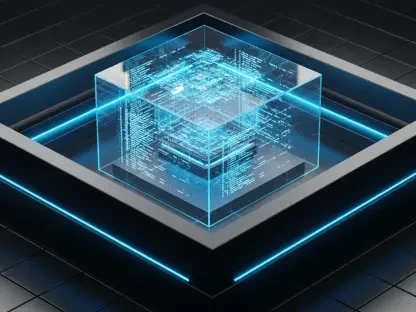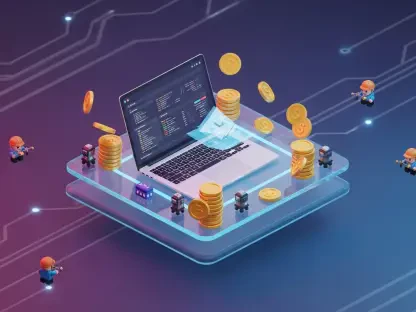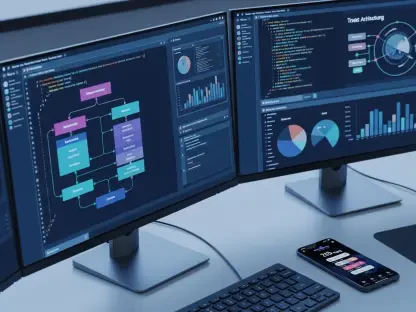In the world of software development, where technological advancements rapidly transform processes and workflows, GitHub has emerged as a pivotal platform for developers worldwide. This platform acts as a global repository, overseeing the collaborative process of code creation, storage, and sharing. With the introduction of the GitHub Copilot Coding Agent, a groundbreaking enhancement in AI-driven software development, GitHub is set to revolutionize the industry further. Amid the seamless integrations that Copilot promises, the introduction of this new technology raises pivotal questions about the future of developer roles and the inherent balance between automation and human creativity in programming.
Transforming Collaboration in Software Engineering
The Role of GitHub as a Development Hub
GitHub, having established itself as a cornerstone for open-source projects, has seamlessly integrated various essential functions like version control, branching, and project management into its ecosystem. Acting as a virtual collaborative workspace, it provides developers with the tools necessary to manage and track code with precision and efficiency. This platform has drastically reduced the complexity and time required for project coordination, which traditionally involved lengthy meetings and endless lines of emails. By bringing all processes under a single umbrella, GitHub fosters an environment where developers can seamlessly transition from individual coding tasks to comprehensive project management.
Central to GitHub’s utility is its version control system, which meticulously tracks every modification in the codebase. This ensures that teams, irrespective of their size, are synchronized in real time. These features are amplified by GitHub’s ability to facilitate branching, allowing developers to explore new ideas without affecting the main project until they are ready to be integrated. This level of coordination and flexibility previously required hours of manual tracking and negotiation between team members. As a result, GitHub has become more than just a repository; it’s a dynamic environment where ideas and solutions are continuously evolving. The recent introduction of tools like GitHub Copilot further exemplifies how these collaborative frameworks can be enriched by artificial intelligence, heralding a new era of streamlined and efficient software development.
The Emergence of GitHub Copilot
The emergence of AI-driven tools like GitHub Copilot marks a significant shift in the capabilities available to developers. Unlike traditional coding environments, where manual input is required for almost every function, Copilot introduces an element of intuitive assistance. Its primary function lies in suggesting real-time code completions, easing the workload on developers and streamlining the development process. This AI tool doesn’t merely suggest lines of code; it understands the context of the current task and predicts what comes next, significantly optimizing efficiency. GitHub Copilot thus acts as an innovative assistant, learning and adapting to individual developers’ styles and preferences.
The AI-driven versatility of Copilot also extends beyond simple code suggestions. It can identify potential errors, offer alternative coding strategies, and even recommend best practices based on a wealth of data accumulated from thousands of coding examples. This level of adaptability transforms Copilot into more than just a coding assistant; it becomes a mentor that amplifies the capabilities of a developer without overshadowing their creativity. As such, Copilot is poised to not only influence how code is written but also how developers progress in their careers, offering an adaptive learning environment that both nurtures and challenges them.
Advancements in AI: Introducing the Copilot Coding Agent
From Assistant to Active Agent
The transition from an AI coding assistant, as embodied by GitHub Copilot, to an active agent, exemplified by the Copilot Coding Agent, brings a host of new possibilities to software development workflows. Traditionally, Copilot operated within the realms of offering code suggestions, augmenting developers’ productivity by reducing routine tasks. However, the introduction of the Coding Agent shifts this paradigm significantly. This new level of functionality enables the agent to proactively manage entire coding processes, not merely by assisting but by autonomously handling tasks within GitHub’s expansive ecosystem.
What sets the Copilot Coding Agent apart is its ability to transcend the boundaries of traditional AI assistance, stepping into roles that involve the management of low- to medium-complexity coding tasks. By assuming responsibility for repetitive or mundane components of software projects, the agent allows developers to channel their skills toward more nuanced elements of design and problem-solving. Moreover, the agent’s function is specifically geared toward well-tested codebases, ensuring that while it automates routine tasks, the integrity of complex projects and novel code innovations remains the domain of human expertise. This automation not only accelerates development timelines but also encourages developers to engage more deeply with their creative potential, confident in knowing that the routine minutiae are efficiently managed.
Enhancing Workflow Integration
The advancements brought about by the Copilot Coding Agent also extend to enhanced integration within development workflows. Acting as an interconnected component within the GitHub ecosystem, it facilitates various stages of the software cycle with precision and speed. One of its key capabilities lies in its integration into continuous integration and deployment pipelines, which are critical to modern software practices. By generating and modifying code autonomously, the agent streamlines processes that were traditionally time-intensive and manual. This integration offers developers a seamless experience where code can be synthesized, analyzed, and deployed—effortlessly bridging the gap between inception and execution.
Such integration does not come without considerations for control and security. Microsoft has been keen on establishing protocols ensuring the Coding Agent operates within predetermined safety boundaries. For instance, the agent is restricted to modifying only the branches it has created; this maintains a robust layer of security and reviewability, ensuring that no unauthorized changes slip into the production environment. Human oversight remains a critical component in this automated process, with revisions and evaluations providing the necessary checks and balances to maintain code integrity. This measure of control not only preserves the quality of the output but also instills confidence among developers and stakeholders that the use of AI does not compromise project objectives or security.
Navigating the Industry Impact
Implications for Developer Roles
The rapid evolution of AI in software development, as seen with the introduction of the Copilot Coding Agent, brings with it implications for the roles and responsibilities of developers in the industry. While automation augments efficiency by covering routine tasks, it also realigns the focus of developers from mundane coding to more strategic, creative, and analytical challenges. This shift prompts a reevaluation of skill sets that are in demand and challenges developers to continually adapt and upskill in an evolving landscape. Though AI handles baseline coding activities, the increasing complexity of tasks assigned to human developers emphasizes the need for innovation and deeper problem-solving abilities.
As AI takes on more routine responsibilities, entry-level developers might face changes in how they traditionally gain experience in a codebase. The career trajectory, which often begins with handling simpler tasks, may require reevaluation. As development processes become increasingly reliant on advanced coding strategies and collaborative problem-solving, junior developers are encouraged to engage more with sophisticated aspects earlier in their careers. While this prospect could initially seem daunting, it emphasizes the importance of fostering environments that support accelerated learning and innovation-driven work experiences. This evolution underscores the value of adaptability and creativity over rote execution, positioning the developers of tomorrow as strategic contributors to technological advancement.
Responsible AI Usage and Security Protocols
The integration of AI-driven tools like the Copilot Coding Agent necessitates a commitment to responsible usage to minimize risks associated with automation. As AI takes on greater operational responsibilities, balancing innovation with safety becomes essential. Microsoft has implemented robust protocols to ensure compliance with best practices in AI deployment, focusing on the ethical and secure integration of these tools into existing workflows. Stringent network access restrictions and extensive review mechanisms are in place to prevent potential breaches or disruptions in the development pipeline.
Moreover, the emphasis on human oversight in reviewing and vetting changes made by the Coding Agent underscores the collaborative synergy between AI and human developers. By ensuring that each automated action undergoes stringent evaluation, Microsoft maintains the integrity of both the process and the output. This integrated approach champions a vision where AI assists rather than replaces human expertise, aligning automation benefits with human ingenuity. As the software industry continues to evolve toward more automated processes, clear guidelines and safeguards will be vital in leveraging AI’s capabilities while upholding trust, security, and ethical standards in software engineering.
The Future of AI-Driven Development
Bridging Automation and Human Creativity
The introduction and subsequent evolution of AI tools like GitHub’s Copilot Coding Agent signify a pivotal moment in the software development landscape. As AI technologies become more embedded in the fabric of development processes, finding a harmonious balance between automation and human creativity remains paramount. The Coding Agent, by automating routine code tasks, offers developers the luxury of focusing on creative elements without the distraction of repetitive technical chores. This balance paves the way for unprecedented innovation as the bulk of mundane tasks is seamlessly managed, unlocking new opportunities for experimentation and creativity.
The synergistic relationship between AI tools and developers is a testament to the possibilities that arise when technology supports, rather than supplants, human efforts. By acting as a catalyst that magnifies developers’ strengths, AI can propel software engineering to new heights. This collaboration cultivates an environment where human expertise and machine efficiency work in tandem, allowing for more ambitious projects, dynamic solutions, and transformative ideas that might otherwise have been constrained by time and resource limitations. As these dynamics unfold, embracing an integrated approach will be fundamental in navigating the future landscape of AI-driven development.
Expanding Opportunities in the Development Ecosystem
In today’s software development landscape, where rapid technological progress consistently reshapes processes and workflows, GitHub has emerged as a crucial platform for developers around the globe. It functions as a comprehensive repository that facilitates the collaboration necessary for creating, storing, and sharing code. The introduction of GitHub’s Copilot Coding Agent, a pioneering advancement in AI-infused software development, signals a potential revolution for the industry. By offering seamless integrations, Copilot stands to enhance the coding experience significantly, but it also brings about critical discussions regarding the future roles of developers. This AI-driven tool raises important questions about how programming tasks will evolve and how automation might coexist with human creativity and problem-solving in coding. The integration of AI tools like GitHub Copilot encourages a reevaluation of traditional workflows, emphasizing the necessity for developers to adapt and find a balance between leveraging these advanced tools and preserving the innovation that only human insight can provide. As software development continues to move forward at an unprecedented pace, platforms like GitHub and its cutting-edge tools will play indispensable roles in shaping the future of coding. The ongoing conversation about human roles in a tech-driven era underscores a crucial turning point in the industry.









